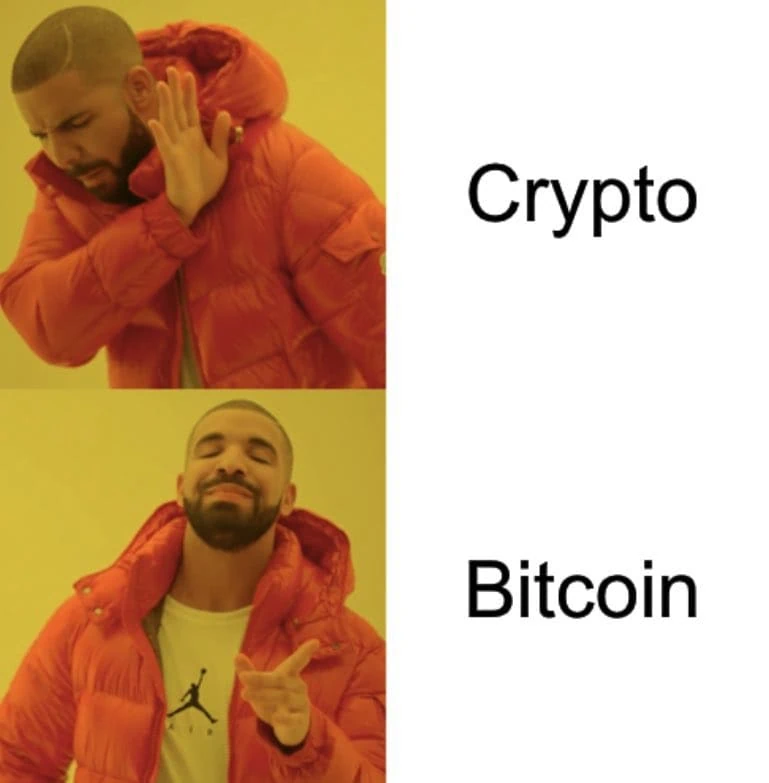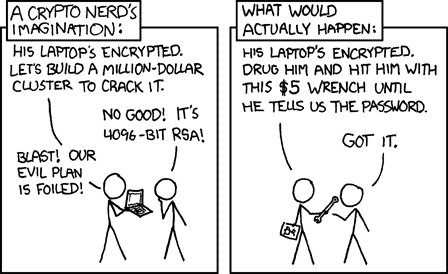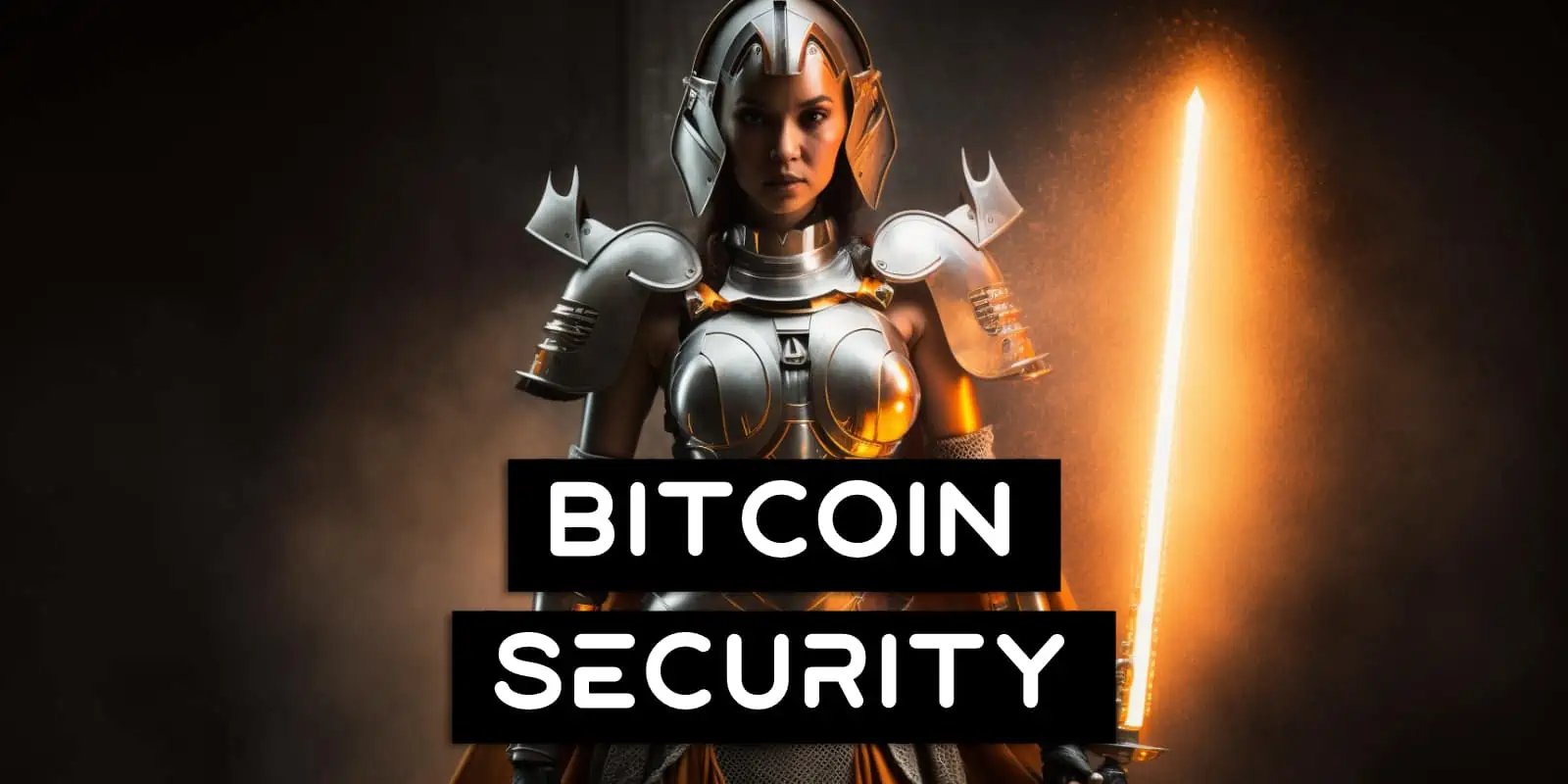Bitcoin security is the most fundamental thing beginners need to learn and for good reason, if you get it wrong your bitcoins will be lost or stolen and there’s no way to “reverse” it.
While we’re Bitcoin experts first, we’re also able to draw from decades of experience in dealing with IT, network and security issues and combine it with our educational background. This allows us to build content that other general news or blog websites simply can’t match and allows you the beginner to get top tier information in a format that’s simple, straight forward and easy to put into practice.
You don’t need to be a tech genius to stay safe in crypto, but you do need to read this guide.
Note: This Security guide is for “Beginner Levels” which are people with either no bitcoin funds or “Pocket Money” level funds. If you’re securing larger amounts, please see our Advanced Bitcoin Security and Expert Bitcoin Security guides
Contents
Key Beginner Bitcoin Security Points
- Avoid Altcoins: Focus on Bitcoin only and don’t buy other cryptocurrencies
- Don’t Use KYC/AML Exchanges: Use our Crypto Exchanges list for top non-KYC exchanges
- Use A Self-Custody Wallet: Download and use your own, private wallet
- Crypto Wallet Security & Backup: Use a strong password and write down your seed phrase
- Practice Good Cybersecurity: Use a password manager, 2FA, keep software updated etc
- Learn As Much As Possible: Get subscribed as knowledge is your best defense
Avoid Altcoins
Bitcoin ONLY, no altcoins
Confucius
Is my Bitcoin safe? If you’re new to cryptocurrencies and Bitcoin this is probably one of the top things on your mind. This is probably because you’ve read the main stream media pieces about how some exchange got hacked, someone lost their coins or how some crypto went to zero.
While they are very much correct that crypto is, for lack of a better word, dodgy af, the critical mistake they make is assuming that these other cryptocurrencies are comparable in any way to Bitcoin. While you might think these other altcoins and Bitcoin are the same, they’re very, very different and should be avoided at all costs!
Saying to avoid altcoins might sound strange given we’re talking about Bitcoin security here, but over the years the number one way people have lost their bitcoin is due to using other cryptocurrencies. Through various reasons their wallet will get compromised due to the other cryptocurrency and as a result, all funds (including their bitcoin) are then stolen. This is why avoiding altcoins is our number one security suggestions. Say it with us:

Bitcoin is the original monetary network that has a number of absolutely critical aspects to it that elevates it orders of magnitude above all others. Not a single other cryptocurrency out there has its network effect, its creation conditions, its size, its branding and recognition, its decentralization or its security. There is simply no second best to Bitcoin. And yes, this also includes Ethereum.
>> Deep Dive: Bitcoin, Not Crypto
As such, one of the first and most important measures you can take to increase your security is to avoid these altcoins. They’re often associated with dodgy pump and dump scams, are heavily targeted by scammers, have software that isn’t as battle tested as Bitcoins and just in general have more convoluted systems which is always the exact thing you want to avoid when it comes to security.
If you insist on using altcoins, at a bare minimum ensure that your bitcoin are stored in a completely separate wallet.
Don’t Use KYC/AML Exchanges
You never appreciate your anonymity until you don’t have it anymore.
Jason Priestley
KYC (Know Your Customer) and AML (Anti Money Laundering) are regulations that many big Crypto Exchanges like Coinbase or Binance comply with. It’s why they require you to “verify your identity” before they let you do anything. They want to know you name, address, drivers license, photo and more. This is just the beginning though.
Once you relinquish your anonymity they link whatever bitcoins you buy to that identity. Forever. With this one innocuous step the exchange, governments, and other third parties can:
- Track what you spend your money on
- Track what your balance is
- Track what taxes you should be paying
- Sell all this information to other companies without telling you
- You get the picture
Then, when the exchange gets hacked, your data spills out for criminals and scammers to buy and use. Now these bad people have data that basically says “John Smith has $1m in Bitcoin and lives here”. They know how much Bitcoin you own and where to go to beat you with a $5 wrench to get it, which is obviously a huge security problem you want to avoid!

This is why you should only ever use non-KYC Exchanges to buy your bitcoins. To help guide you with this we have built a custom Crypto Exchanges list page. Our Crypto Exchange Rating Methodology for this list not only prioritizes your privacy and security, but is also completely open source and free for anyone to verify, just like Bitcoin. Buying non-KYC bitcoins is by far one of the best things you can do for multiple privacy and security reasons.
To make sure you get off to the best start, we also have step-by-step guides detailing exactly how you can buy your first non-KYC bitcoins from some of our top reviewed and rated exchanges:
Use A Self-Custody Wallet
Not your keys, not your coins.
Having a self-custodial Bitcoin Wallet (also called a non-custodial or private wallet) and holding your own Private Keys is the next most important thing to do when it comes to good Bitcoin security. This is because whoever holds your private keys has full control over your funds. They can steal and spy on them at all times.
Many who have trusted third parties with their keys such as centralized crypto exchanges that have online wallets have lost all their bitcoin. People have even lost their fiat money (USD, Euro etc) by using Fiat Wallets with these exchanges too. Examples include: MtGox, Cryptsy or the most recent FTX and this happens so often we even have a dedicated Crypto Exchange Bankruptcies page!
If you have funds on a centralized exchange. Get. Them. Off. Now. You’ve been warned!
To take custody of your own private keys means you’ll need to download and install your own Bitcoin Wallet software as detailed in our guides below. If you’re a Beginner, just focus on setting this up and ensuring you only buy from non-KYC sources as described above.
Even if you don’t have a large amount of funds right now it’s highly recommended to use a secure bitcoin wallet that’s non-custodial to begin with as it not only helps you get used to using them for later, but also gives you a much better look into How Bitcoin Works and what trusted software for it looks like.
>> Learn More: What Is A Bitcoin Wallet?
Many beginners are scared to self custody their own funds as they think they’ll stuff it up, so they go the “easier” route of trusting some criminal company like FTX with their funds and get rekt. What they fail to realize is that taking self custody of something isn’t new, you’ve been doing it your whole life with your food, your car, your books, jewellery and more.
Taking custody of your own possessions isn’t new or complicated and taking custody of your bitcoins isn’t either, it just takes a little bit of common sense and precaution. Companies (especially big exchanges) like to pretend it’s scary and hard so they can trick you into using their unneeded products and services like those atrocious “there must be a better way” infomercials from the 90s.

As a beginner you don’t have to master every aspect of knowing how to secure your crypto wallet. Simply downloading a reputable one and transferring your funds to it will get you better security than 99% of other people out there.
Crypto Wallet Security & Backup
Once you have a proper non-custodial wallet installed it’s important to make sure you keep it secure and back it up properly. For most modern wallets, this means protecting access to it with a long, strong password and keeping your seed phrase or mnemonic sentence (the 12 or 24 words that are generated for you) offline at all times.
The best way for beginners to do this is to simply write down the seed phrase words on a piece of paper (or two), laminate it and store it in a safe place (or two). This level of security along with a good password for the wallet is fine for pocket money levels of bitcoin.
This is a beginners guide, so we are assuming you only have “pocket money” levels of funds in your wallet. As your funds increase you’ll need to move into the Advanced levels of both privacy and security as outlined in our Bitcoin Levels chart below. For most this means buying a Hardware Wallet once funds get into the “Savings Account” level numbers.
| Level | Beginner | Advanced | Expert |
|---|---|---|---|
| Funds Amount | Pocket Money | Savings Account | Serious Investments |
| Exchange Type | Non-KYC | Non-KYC | Non-KYC |
| Wallet Type | Software (Hot) / Hardware (Cold) | Hardware (Cold) | Hardware (Cold) |
| Signature Type | Single Signature | Single Signature | Multisig |
| Key Custody | Self Custody | Self Custody | Self Custody |
| Key Backup | Laminated Paper | Laminated Paper | Metal Seed Plate |
| Key Locations | 1+ | 2+ | 2+ |
| Key Security | None | Fire Proof Safe | Multiple Methods |
| Own Full Node | No | Yes | Yes |
| Electrum Server | Public Electrum toggle_on | Private Electrum toggle_on | Private Electrum toggle_on |
| Tor | No | Yes | Yes |
If you find yourself in the Advanced level of funds that’s fine, we also have a very in depth piece to help teach you exactly How To Protect Your Bitcoin Private Key.
Practice Good Computer Security
As your bitcoins are entirely digital, it means your everyday IT security is what stops hackers and scammers from stealing them. Some of us here at Athena Alpha have worked in IT companies for literally decades, are well versed in cybersecurity and have disclosed significant data breaches to major organizations. So we know that digital security is an exceptionally hard problem!
However, as this is a beginners guide, it means we’re not dealing with large amounts of funds so it’s not necessary to have huge, complex security measures. We don’t want you starting off with bad habits though, so here are some simple computer security practices you should strive for:
- Password Manager: Use a password manager to generate and store long, unique passwords for your wallet and online accounts. A great option is Bitwarden. It’s open source and offers free personal accounts plus you can even host your own Bitwarden compatible server (called Vaultwarden) and ensure all passwords never leave your control
- 2FA: If the account has Two Factor Authentication make sure you use it. SMS based is better than nothing, but App based is far better if you have the option
- Keep Clean: Make sure you install the least amount of apps possible on phones or laptops. With every app you get another hole in your security, plus it slows your computer down too
- Keep Clean Online: Similar but slightly different, make sure you sign up to the least amount of online services possible. Most people reuse passwords meaning that a data breach somewhere turns into a breach everywhere. Even if you don’t reuse passwords, the more services you have going, the more risks you run
- Updates: An easy one, always make sure your software is kept up to date
- Security Breaches: Stay updated about security breaches and how they may affect you. Use Have I Been Pwned to check if your account has been compromised
- Avoid Public WiFi: Free or public WiFi can be great… but also introduces many potentially bad actors that can intercept and spy on traffic. At a bare minimum, try to avoid using them with the computer that has your Bitcoin wallet on it
>> Learn More: Home Network Security Best Practices
Learn As Much As Possible
While Bitcoin is quite simple at its core, like many other “simple” things in nature it spawns highly complex and dynamic systems over time. While understanding everything to do with Bitcoin isn’t needed to use or invest in it, it’s good to stay up to date by subscribing to our free newsletter.
Scams

Scams in crypto are legion. That being said they’re basically the same as what you find with computers and online security in general. This is excellent news for all beginners as it means it’s one less thing you need to learn!
From phishing emails to data leaks at companies you should be very familiar with it if you’ve ever read anything about scams or computer hacking over the past 20 years. The main difference with Bitcoin scams is that they’re usually trying to gain access to your Seed Phrase (those 12 or 24 words again) rather than you Gmail password.
To help point out the subtle differences and go through the most seen scams we’ve already written a thorough guide linked below, outlining how to spot and avoid them. If you’re trying to increase your Bitcoin security and make sure your cryptocurrency is safe, we highly recommend reading through this list at least once.
>> Deeper Dive: 20 Bitcoin Scams: How To Spot And Avoid Them
Being aware of the most popular ways scammers behave will mean that when you see it in real life, it’ll stick out like a sore thumb and you’ll instantly know what to do. We could hide this info behind our Athena Alpha Pro subscription, but we deemed this too important, especially for beginners so it will be free for everyone forever.
FAQ
Can Bitcoin Be Hacked?
It’s important to separate your Bitcoin wallet and Bitcoin the network. Many people have had their computers compromised and their personal Bitcoin wallets hacked which is why we provide this security guide. However the Bitcoin network itself has stood for over a decade now with upwards of a trillion dollars on the line and is still untouched.
Is Bitcoin Safe And Legal?
Just like with any other type of money, bitcoins are highly sort after and so there’s plenty of criminals, scammers and other things to watch out for. That being said Bitcoin Is Real, quite safe and has been a reliable Store Of Value over the past 10+ years.
Its legal status, just like many other things, varies from country to country. Some countries have already made it legal tender, while others outright ban it. It’s best to check with your local laws for its legal status as they will be the most up to date.
What Should Beginners Know About Bitcoins?
Bitcoin is quite different to traditional fiat monies such as the USD or EUR and so there’s a number of important things beginners should know. To help with this, we have a dedicated section to Beginners as well as another special category called Bitcoin 101.
How Do I Keep My Bitcoin Safe And Secure?
Our top security recommendations are:
– Avoid Altcoins: Focus on Bitcoin only and don’t buy other cryptocurrencies
– Don’t Use KYC/AML Exchanges: Use our Crypto Exchanges list for top non-KYC exchanges
– Use A Self-Custody Wallet: Download and use your own, private wallet
– Crypto Wallet Security & Backup: Use a strong password and write down your seed phrase
– Practice Good Cybersecurity: Use a password manager, 2FA, keep software updated etc
– Learn As Much As Possible: Get subscribed as knowledge is your best defense



